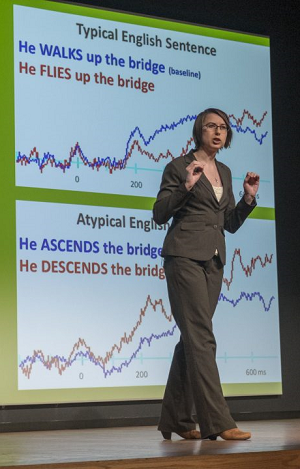Do You Run Down the Mountain or Descend? That All Depends on Your Native Language!
Thursday, March 18, 2021
Have you ever wondered why a foreign language may sound “wrong" when you've translated it into English? It's because that language may express certain parts of speech differently. Different groups of languages use verbs to express different aspects of motion, and the people who speak these different languages
expect to hear motion described in a certain way.
 Samantha Emerson, Ph.D., conducted a study focused on what listeners' expectations were for the expression of motion. For example, what does an English speaker expect to hear, versus what a Spanish speaker expects to hear, when discussing someone headed down the mountain?
Samantha Emerson, Ph.D., conducted a study focused on what listeners' expectations were for the expression of motion. For example, what does an English speaker expect to hear, versus what a Spanish speaker expects to hear, when discussing someone headed down the mountain?
An English speaker expects the manner of the motion (or how the motion verb is carried out) to be included in the verb or come first, hence, the phrase “run down the mountain." 'Run' describes how the subject is moving (the manner), and 'down' describes where the subject is moving (or, the path of the verb). A Spanish speaker, on the other hand, expects the path to be the important part; therefore, a phrase like “descend the mountain running" is used. 'Descend' tells us where the subject is going (the path), and 'running' tells us how the subject is moving (the manner).
“The important thing about this paper is it's the first one to show that not only do we talk about motion differently, but it effects the way we
think about motion, even though physical motions happen the same way regardless," noted Emerson, who is now a researcher at the Center for Childhood Deafness, Language and Learning at Boys Town National Research Hospital®.
The answers to these questions are important. The findings from this research could eventually help those trying to learn a second language. It could also assist people with developmental language disorder in understanding patterns beyond the basic rules of grammar in their native language.
“They tell us something about learning a new language," said Emerson. “Learning to speak a language fluently involves more than just the rules of grammar. This (study) provides a neural basis for observations about how we prefer to talk about motion, but also affects how easy it is to process other people's speech."
Learn how the researchers created this
fascinating study.
